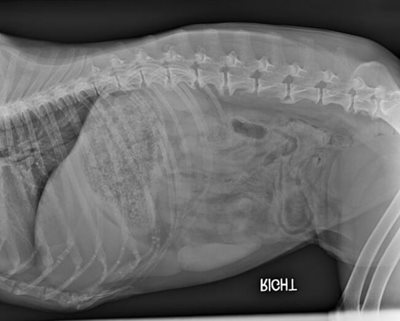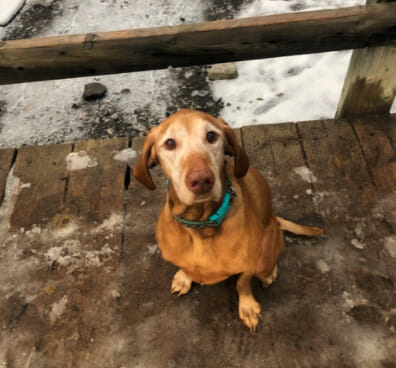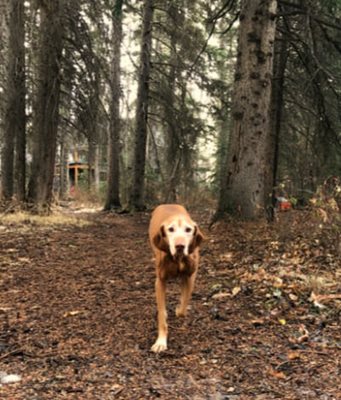Meet Sammy! This sweet and loving 10-year-old Vizsla has been through a roller-coaster of health concerns. Let’s learn about one of the diseases she has been diagnosed with, managed, and how she is doing today as a long-living senior pet!
How It All Started
In September of 2019, Sammy presented with low energy, decreased appetite, on and off diarrhea, and shaking. There was a wide range of possible underlying issues. In order to determine what was going on with Sammy, her veterinarian performed blood work and x-rays, followed by an ultrasound examination.
Abdominal x-rays revealed fluid in the intestines, and the subsequent ultrasound showed fluid in the abdomen and enlarged abdominal lymph nodes. Slides were made of cells extracted from the lymph nodes, and were sent out to the external laboratory. These revealed reactive lymph nodes, caused by inflammation or cancer. Her blood work showed an increase in a liver enzyme called ALP, and a mild decrease in albumin.

What did this mean for Sammy?
ALP is an enzyme that can be elevated with liver or gall bladder disease, Cushing’s disease, certain cancers, or bone remodeling in the body.
Albumin is an important protein found in blood and a reduction in blood albumin levels raises concern for a systemic disease leading to loss or lack of production of the protein. Sammy’s veterinarian’s initial suspicion was for an inflammatory condition or cancer. To distinguish between the two, Sammy would have to undergo an exploratory abdominal surgery to collect tissue samples from her intestines, lymph nodes, and any other abnormal-looking organ.
At the time, Sammy’s family did not want her to go through surgery, and opted for supportive care. This included:
1. Fluid therapy at the clinic
When there are low levels of albumin in the blood, fluid is forced out from the circulatory system (i.e. blood) into body cavities and tissues. For this reason, Sammy was given intravenous fluids to correct the loss of blood volume.
2. Change in diet
Because Sammy’s clinical signs may have been due to a food allergy and/or pancreatitis, she was transitioned to a novel protein diet that is low in fat. In her case, the Rayne Kangaroo was chosen.
3. Prescribed medication
An anti-nausea medication, an anti-diarrheal medication, a probiotic, and a gastro-protectant medication were prescribed.
Follow-Up
For a couple of months, Sammy’s condition waxed and waned, with the occasional episode of vomiting and diarrhea.
In November of 2019, she presented again with lack of appetite for two days and vomiting. This time, her blood work revealed a significant decrease in albumin. To prevent further complications, Sammy was given an intravenous albumin transfusion. After her albumin levels improved, her family elected to have us perform the exploratory surgery to help further understand what was going on. Was it an inflammatory condition or was it cancer? Tissue samples were taken from the intestine and lymph nodes, and sent to an external laboratory. The results revealed that Sammy was suffering from inflammatory bowel disease with lymphangiectasia.

What is inflammatory bowel disease (IBD)?
IBD refers to a group of chronic gastrointestinal disorders characterized by recurrent gastrointestinal signs and inflammation of the mucosa of the GI tract.
The exact cause of IBD is not well known, but is thought to occur due to uncontrolled intestinal inflammation in response to a combination of factors, including:
• Environmental
• Microbial
• Dietary
• Changes within the immune system
In Sammy’s case, it is thought to be due to an auto-immune reaction to an unknown dietary trigger. In other words, Sammy’s immune system was reacting to a specific protein in her diet, creating inflammation in her intestinal wall. Treatment for IBD involves a novel protein diet. This means feeding a formula that contains only one protein that Sammy has never been exposed to, in order to prevent a reaction. Medications that suppress the immune system may also be required in order to better manage this condition.
What is lymphangiectasia?
Lymphangiectasia is a form of “protein-losing enteropathy”, a disease that causes proteins, such as albumin, antibodies, and blood clotting proteins, to leak from the intestines and be lost in the feces. The gastrointestinal system has a network of lymphatic vessels that drain fat, protein, and fluid from the gut.
A well- functioning lymphatic system is crucial for a healthy immune system.
In the case of a dog suffering from lymphangiectasia, the vessels become inflamed, dilated, and blocked with inflammatory cells. The intestines are then unable to absorb fat and, instead, leak out lymph, including fats, cells, and delicate proteins, into the intestinal tract. This often leads to malnourishment. In Sammy’s case, this abnormal loss of lymph was caused by her inflammatory bowel disease.
The reduced levels of albumin in Sammy’s blood was secondary to loss through the intestines due to their severe inflammation.
Reviewing Sammy’s history, it is now understandable why her blood work revealed low albumin levels. This protein circulates in the bloodstream, acting as a transport system for biochemicals to go from one place to another. Albumin is also responsible for keeping fluid in the bloodstream. When levels are too low, fluid cannot be held in the bloodstream and ends up leaking out into body cavities or tissues. In Sammy’s case, it was leaking into her intestines and abdomen.

How were Sammy’s diseases managed?
Management involved:
Diet therapy
• A novel protein or hydrolyzed protein diet (for her IBD) that is low in fat (ideal for lymphangiectasia), such as the Purina HA formula
Therapies to suppress Sammy’s immune system
• A steroid called prednisone that also has anti-inflammatory properties
• Cyclosporine: a drug that suppresses the immune function in the treatment of allergic and autoimmune disorders
• Chlorambucil: a chemotherapy drug that further suppresses the immune system
Ancillary therapies
• Anti-nausea medication called maropitant
• Anti-diarrheal medication that also has anti-inflammatory properties, called tylosin
• A hypo-allergenic probiotic, such as Aventi GI
• Vitamin B12 injection once weekly to compensate for the intestinal loss
A few weeks after these therapies were implemented, Sammy returned to us for a check-up. An ultrasound showed that Sammy no longer had free fluid in her abdomen, her abdominal lymph nodes were smaller in size, and the inflammation had improved. Blood work was repeated later on and showed normal albumin levels. Sammy still comes in for frequent blood work and check-ups, and is currently being weaned off some of her medications with success.
Being old does not have to mean feeling old and unwell.
This long journey shows us that frequent wellness examinations are crucial for our senior pets. Disorders often show up later in dogs or cats’ lives, and catching them early means that therapies can begin early and help our pet’s live a longer and more comfortable life. Thanks to her family that have been attentive to her health needs and providing her with veterinarian-recommended treatment plans, Sammy is living her golden years happily and comfortably!
